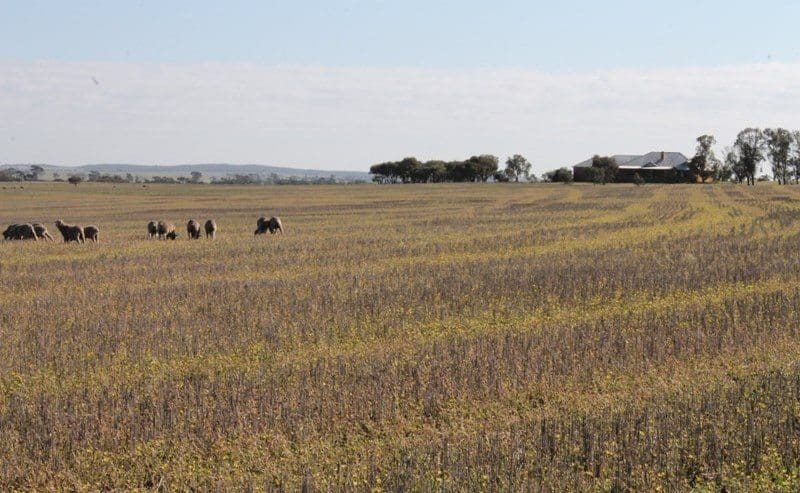IN LAST week’s report we looked at two examples of strategic alliances of local farming families, including one case study where a group outbid corporates for an aggregation comprising 10 farms in the Western Districts of Victoria.
This week, we examine why 12 members of a buying syndicate paid a premium for a big landholding in Western Australia and in doing so, outbid two corporate offers.

The White Property Group’s Yallambee holding, comprising 15,500ha is located near Carnamah, in WA’s mid-west region.
The White Property Group (Yallambee) comprising 15,500 hectares of country is located near Carnamah, in WA’s highly-regarded mid-west region.
The aggregation had been strategically acquired over 90 years by three generations of the White Family. The property has been described as an impressive fully-operational mixed farming enterprise boasting a track record of productivity, a substantial stock carrying capacity and excellent cropping yields.
When Yallambee was offered for sale in June last year, real estate agent Steve Vaughan from VNW Independent believed it was a corporate buy.
“Three corporate entities viewed the property and two showed strong interest, but they wouldn’t pay the $24 million price tag,” he said.
Mr Vaughan said there was also strong local farmer interest driven by a great start to the season.
“By August, the property had had well above its annual rainfall and by late spring, the crops were set, which was a huge drawcard for buyers. The locals saw the sale as a rare opportunity to add on to their existing holdings.”
Break-up option
Mr Vaughan then realised there would be enough local competition to achieve or exceed the property vendor’s price expectations. “We decided to offer the property as a ‘break-up’ to nearby or adjoining farmers,” he said.
When the major shareholder, Bruce White decided to retain a third (or 4500ha) of the property and continue farming for a period of time, the price tag fell to $16m and put further pressure on the sale.
Mr Vaughan said the White Property Group agreed to split the remaining land into 12 blocks.
“The easy and simple way of handling it would have been a one-off sale to one group. There’s far more work involved in sub-dividing a property, but Mr White was happy that locals were given the opportunity to increase their enterprise scale, especially because there had been only one or two small farm sales in that region in the previous four to five years.”
Mr Vaughan advised potential buyers to put in three submissions on three separate pieces of land, because of the intense competition.
“Neighbours, friends, brothers and cousins were bidding against each other, because turnover and listings opportunity had been so limited in recent times. People had been waiting for something like this to come along.”
In the end, some of the land achieved values that Mr Vaughan thought were 20 percent higher than anything previously achieved in the region. In total, the White Group Property achieved $17.5m, $1.5m above price expectations.
While there were 12 happy buyers, there were a number of strong contenders – adjoining owners, all strong farming families – who missed out.
The successful outcome was due to a combination of factors, according to Steve Vaughan.
“The first was a significant year and well above average yields. The second were low interest rates and money readily available for farm acquisition. And lastly, there had been very little farm sale activity in the region for quite some time.”
Why aren’t there more collaborative purchases?
Last week’s story about North Queensland’s Wandovale Station showed strategic alliances of smaller producers can be extremely successful when it comes to very large cattle stations. So why hasn’t the Wandovale example been repeated more frequently?
Mr Vaughan said one of the issues is that size must be maintained. “Land laws won’t allow some properties to be split up. As a result, alliances are a possibility and a combination of local and overseas interest is something that’s being talked about.”
Martin Pentecost from Brisbane-based Powers rural accountants and advisors believes strategic alliances should be considered for large cattle ventures. “Particularly if a sizeable block comes up that an individual can’t afford to purchase, if it has a number of titles, then interested neighbours should be talking,” he said.
However, he admitted it could be difficult to find the right mix of investors.
Mr Pentecost was surprised an Australian consortium didn’t come together to bid on the assets of Kidman & Co.
“It would have been a great opportunity for a group of large private investors to buy the properties, in the same way that Stanbroke Pastoral Company was purchased and de-constructed in 2004,” he said.
Back then, beef companies and some of the country’s leading cattle families were scrambling to vie for control of Australia’s biggest ‘pastoral prize’.
It was eventually bought by the Nebo Consortium – a group made up of Jack Cowin, founder of Hungry Jacks, the late Peter Menegazzo, Australia’s largest potato grower, and four prominent Central Queensland pastoral families – Peter and Jane Hughes, Ralph and Bev Rea, Wally Rea and John and Jan Burnett.
Mr Pentecost suspects the reason why producer purchasing alliances/consortiums aren’t currently more common is serviceability of debt in a hot investment market where land values are escalating.
“Some people don’t have the equity to handle another stage, others are over leveraged and some landowners are not seeing any return on their investment,” he said.
For those considering joining forces, Mr Pentecost urged them to ‘put everything on the table.’
“There is potential to expand property assets by leveraging off each other, but firstly, determine what each party wants to achieve from the process. Be very clear on what you want the outcome to be before you enter into it.”
